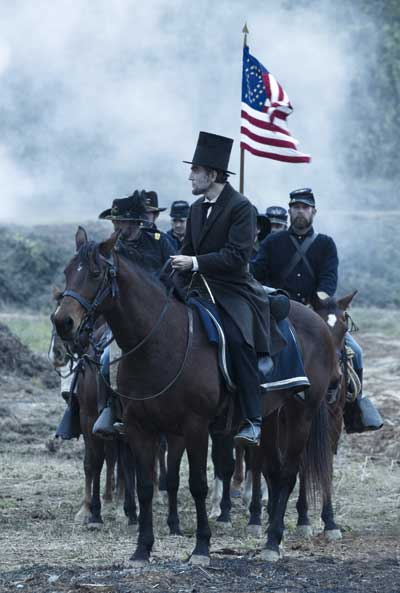I cannot tell you about all the things Steven Spielberg can and cannot do. I cannot tell you, for example, if he can make decent goblets from Quality Street wrappers or funny teeth from orange peel, as I can, but what I am able to say is this: he knows how to tell a story; where to start it, where to finish it, what to do with all those fiddly bits in the middle. And although Lincoln is a film that pays fantastically close attention to politics — not a negative per se, but unless you are on top of your American history you may occasionally find yourself scratching your head — its narrative swoop largely takes the legislative detail in its stride, plus the star is Daniel Day-Lewis, which is always a thing. He is not so much an actor, more a shape shifter. He could, I think, play anything and make you believe it. He could play that coaster on your table over there. Maybe he is playing that coaster on your table over there. If I were you, I’d poke it around before putting any hot drinks down, just to check. (You don’t want to scald Daniel Day-Lewis just because you need somewhere to place a warm beverage.)
According to the press bumf, which, for some reason, I did not immediately toss into the bin — I am usually most assiduous about this — it took Spielberg and screenwriter Tony Kushner a decade to come up with the right Lincoln story to tell; one that would, I guess, capture the essence of the man. And the story they have chosen is the final four months of his life, which included the passage of the 13th amendment abolishing slavery, the end of the Civil War with the surrender of the Confederacy, and his assassination. Abraham Lincoln, obviously, was the sort of man who could get quite a lot done in a short amount of time. Shaming. Particularly when you consider I’ve been thinking about getting my windows cleaned for the past three years. I don’t know how long it would take me to get around to being assassinated. My whole life, probably.
Anyway, the film opens with a brutal, muddy Civil War battle, but if you’re then expecting it to settle into yet another speechifying costume drama, I can also tell you this: it never does. Mostly happening in the dark-brown back rooms of Washington, a dingy place of politicians on the make, it follows Lincoln’s attempts to pass the slavery amendment before the end of the war. Politicians must be bribed, cajoled, strong-armed, promised jobs or subjected to intellectual persuasion. It’s very wheelery-dealery, quite like Borgen, but not Danish, and with a chin and a beard. The camera leaves these dark rooms rarely, and when it does it is mostly for the White House and Lincoln’s wife, Mary (a terrifically good Sally Field), who is still grieving for the loss of one of their sons and must contain her own hysteria. These scenes are short, barely more than a few minutes at a time, but are movingly powerful. I cried more for Mrs Lincoln than I ever did during Les Mis and that man who stole the bun.
The stiffest challenge of a film like this may be: how much exposition is too much and how much too little? The exposition here is well done, taking place mainly in Lincoln’s vivid, intimate conversations with his Secretary of State William Seward (David Strathairn) as well as with his party’s founder, Preston Blair (Hal Holbrook), who is more interested in ending the war than slavery. British audiences will, to a certain extent, have to keep on their toes and play catch-up. Did you know, for example, that Republicans at that time were more like Democrats and Democrats more like Republicans? Perhaps you did, but I didn’t, and was quite confused. Still, that narrative swoop keeps everything moving, excitingly. Indeed, you know you are in the hands of someone who can tell a story when the passing of an amendment becomes suspenseful, even when you know the outcome.
Is this Day-Lewis’s film? Seriously, you have to ask? His Lincoln is soft-spoken and hunched, exhausted by the years of war. He likes to talk in stories and parables, often exasperating his cabinet. He is cunning, but gentle with his children and uncomfortable with ceremony. (His disdain for dress gloves is a running joke.) Or at least this is Daniel Day-Lewis’s portrayal, and I believed every minute of it, and was riveted. I recommend you see this film but don’t recommend that when you put your feet up this evening you put them up on a pouffe. Or, if you do, check it isn’t Daniel Day-Lewis first.






Comments